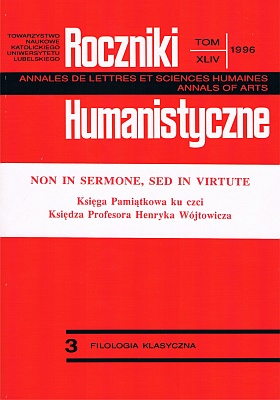Mowa gońca w Hekabie Eurypidesa (518-582)
Abstrakt
The author carries out a literary analysis of the messenger's speech in Hecuba and seeks to grasp its function in this drama. Therefore he presents the narrative situation of the speech, its character of a report and information, but also interpretation and evaluation. He pinpoints that the role of a messenger in this tragedy is fulfilled by the non-anonymous narrator, yet one of the figures actively involved in the action of the play. It is Talthybius, a man marked with great character, who is able not only to relate the event which has taken place beyond the stage space, but also he may give the event a proper dimension. It is through him that Euripides conveys his audience a lesson that in extreme situations one may preserve human dignity, respect for oneself, or even gain recognition from his enemies. Talthybius' report goes beyond the customary function of the messenger speeches, whose main aim to bring to the stage some events from a remote space. In its interpretative and evaluative structure Talthybius' speech confers a deeper sense of a universal character on the event which is being related. In this function it reminds us the choral chants from Aeschylus' tragedies.
Copyright (c) 1996 Roczniki Humanistyczne

Utwór dostępny jest na licencji Creative Commons Uznanie autorstwa – Użycie niekomercyjne – Bez utworów zależnych 4.0 Międzynarodowe.





